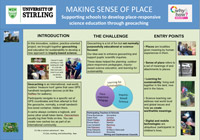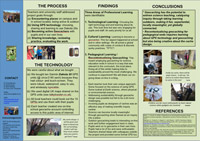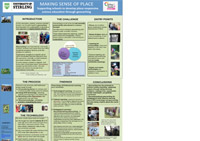Research & Resources on Geocaching – and Geocaching in Education
Links, People, and Reading about Geocaching – some focus on work in Primary schools
http://www.iste.org/docs/excerpts/GCACHE-excerpt.pdf
http://www.geocaching.com/education/
http://blog.geocaching.com/2011/12/new-teacher-tools-geocaching-and-education/
The Garmin – Our Handheld device: Dakota 20
Information page: http://www8.garmin.com/learningcenter/training/dakota/
User manual: https://geocachingforschools.stir.ac.uk/downloads/Dakota-20-manual.pdf
Teaching and Geocaching
http://www.trailsoptional.com/category/geocaching/
Informational Posters
Health & Safety / General Guidance Documents
General Geocaching Placement Guidelines:
https://geocachingforschools.stir.ac.uk/downloads/Geo-Placement-Guidelines-copy.docx
Health & Safety Document 1 – Using Common Sense:
https://geocachingforschools.stir.ac.uk/downloads/H&S-Geocaching-copy.docx
Health & Safety Document 2 – Example Risk Assessment:
https://geocachingforschools.stir.ac.uk/downloads/Final-H&S-Plan-GEO-copy.doc
These links were all of use for getting started with geocaching in schools:
http://www.teachprimary.com/learning_resources/view/using-geocaching-in-primary-schools
http://www.theguardian.com/teacher-network/teacher-blog/2013/apr/04/geocaching-geography-history-teaching-landscapes
http://www.english-heritage.org.uk/education/heritage-learning/issue45/using-ict/case-study-geocaching/
http://www.geojourneys.co.uk/schools/
http://www.coast-alive.eu/content/geocaching-sheringham-park
http://www.creativeeducation.co.uk/blog/index.php/2011/06/geochaching-at-school/
Geocaching forum conversations are also useful places to find ideas:
http://forums.groundspeak.com/GC/index.php?showtopic=318314
http://forums.groundspeak.com/GC/index.php?showforum=106
Some Sources
Dillon, J., & Scott, W. (2002). Perspectives on environmental education-related research in science education. International Journal of Science Education, 24 , 1111–1117.
Mannion, G., Fenwick, A., Nugent, C., & I’Anson, J. (2011) Teaching in Nature. Scottish Natural Heritage Commissioned Report No. 476. Link to project website: http://teachinginnature.stir.ac.uk/index.html
Mannion, G., Fenwick, A. & Lynch, J. (2012) Place-responsive pedagogy: learning from teachers’ experiences of excursions in nature, Environmental Education Research. Vol. 19, No. 6, pp 792-809.
Wals, A.E.J & Corcoran, P.B. (2012) Re-orienting, re-connecting and re-imagining: learning-based responses to the challenge of (un) sustainability. In: Wals, A.E.J. and Corcoran, P.B. (Eds.) Learning for Sustainability in Times of Accelerating Change, Wageningen: Wageningen Academic Publishers.
Inquiry-based Science links:
Harlen, W. (2012). Inquiry in Science Education. Fibonacci Project (available at www.fibonacci-project.eu)
Harlen, W. (2010). Principles and Big ideas of Science Education. Hatfield, UK: ASE. Retrieved 20 September 2012, from http://cmaste.ualberta.ca/en/Outreach/~/media/cmaste/Documents/Outreach/IANASInterAmericasInquiry/PrinciplesBigIdeasInSciEd.pdf
Harlen, W. (2009). Teaching and learning science for a better future. School Science Review, 90 (933), 33-41.
Levy, P., Lameras, P., McKinney, P. and Ford, N. (in preparation). ‘Essential features’ of inquiry-based science education: a critical review and framework
Inquiry Based Science Education: http://www.pathwayuk.org.uk/what-is-ibse.html
IBSE planning template: http://www.pathwayuk.org.uk/resources.html
Fibonacci Project Resources: http://www.fibonacci-project.eu See: Examples of Learning Units for IBSE in primary school



